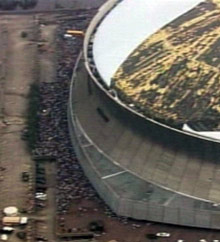CNN anchor, Andersson Cooper get's pretty pissed at politicians congratulating each other:
You can get this from http://transcripts.cnn.com/TRANSCRIPTS/0509/01/acd.01.html
COOPER: Joining me from Baton Rouge is Louisiana Senator Mary Landrieu. Senator, appreciate you joining us tonight. Does the federal government bear responsibility for what is happening now? Should they apologize for what is happening now? SEN. MARY LANDRIEU (D), LOUISIANA: Anderson, there will be plenty of time to discuss all of those issues, about why, and how, and what, and if. But, Anderson, as you understand, and all of the producers and directors of CNN, and the news networks, this situation is very serious and it's going to demand all of our full attention through the hours, through the nights, through the days.
Let me just say a few things. Thank President Clinton and former President Bush for their strong statements of support and comfort today. I thank all the leaders that are coming to Louisiana, and Mississippi, and Alabama to our help and rescue.
We are grateful for the military assets that are being brought to bear. I want to thank Senator Frist and Senator Reid for their extraordinary efforts.
Anderson, tonight, I don't know if you've heard -- maybe you all have announced it -- but Congress is going to an unprecedented session to pass a $10 billion supplemental bill tonight to keep FEMA and the Red Cross up and operating. COOPER: Excuse me, Senator, I'm sorry for interrupting. I haven't heard that, because, for the last four days, I've been seeing dead bodies in the streets here in Mississippi. And to listen to politicians thanking each other and complimenting each other, you know, I got to tell you, there are a lot of people here who are very upset, and very angry, and very frustrated.
And when they hear politicians slap -- you know, thanking one another, it just, you know, it kind of cuts them the wrong way right now, because literally there was a body on the streets of this town yesterday being eaten by rats because this woman had been laying in the street for 48 hours. And there's not enough facilities to take her up.
Do you get the anger that is out here?
COOPER: Well, who are you angry at?
LANDRIEU: I'm not angry at anyone. I'm just expressing that it is so important for everyone in this nation to pull together, for all military assets and all assets to be brought to bare in this situation.
And I have every confidence that this country is as great and as strong as we can be do to that. And that effort is under way. COOPER: Well, I mean, there are a lot of people here who are kind of ashamed of what is happening in this country right now, what is -- ashamed of what is happening in your state, certainly.
And that's not to blame the people who are there. It's a desperate situation. But I guess, you know, who can -- I mean, no one seems to be taking responsibility.
I mean, I know you say there's a time and a place for, kind of, you know, looking back, but this seems to be the time and the place. I mean, there are people who want answers, and there are people who want someone to stand up and say, "You know what? We should have done more. Are all the assets being brought to bare?"
LANDRIEU: Anderson, Anderson...
COOPER: I mean, today, for the first time, I'm seeing National Guard troops in this town.
LANDRIEU: Anderson, I know. And I know where you are. And I know what you're seeing. Believe me, we know it. And we understand, and there will be a time to talk about all of that. Trust me.
I know what the people are suffering. The governor knows. The president knows. The military officials know. And they're trying to do the very best they can to stabilize the situation.
Senator Vitter, our congressional delegation, all of us understand what is happening. We are doing our very, very best to get the situation under control.
But I want to thank the president. He will be here tomorrow, we think. And the military is sending assets as we speak.
So, please, I understand. You might say I'm a politician, but I grew up in New Orleans. My father was the mayor of that city. I've represented that city my whole life, and it's just not New Orleans. It's St. Bernard, and St. Tammany, and Plaquemines Parish that have been completely underwater.
Our levee system has failed. We need a lot of help. And the Congress has been wonderful to help us, and we need more help.
Nobody's perfect, Anderson. Everybody has to stand up here. And I know you understand. So thank you so much for everything you're doing.
COOPER: Well, I appreciate you joining us on the program tonight. I can only imagine how busy you are. Thank you very much, Senator Landrieu.
LANDRIEU: Thank you, Anderson. Thank you so much. Thank you.
COOPER: And good luck to you and all the people working to solve this problem. Because, at this point, it is very hard to try to figure our how this problem is going to get solved. There was a desperate search that we have been following for a baby. We have some great news. This baby has just been found. We're going to talk to the parents of this child. We are just getting this information in. Stay with us. There is a lot ahead to talk about in this next hour.
steve

